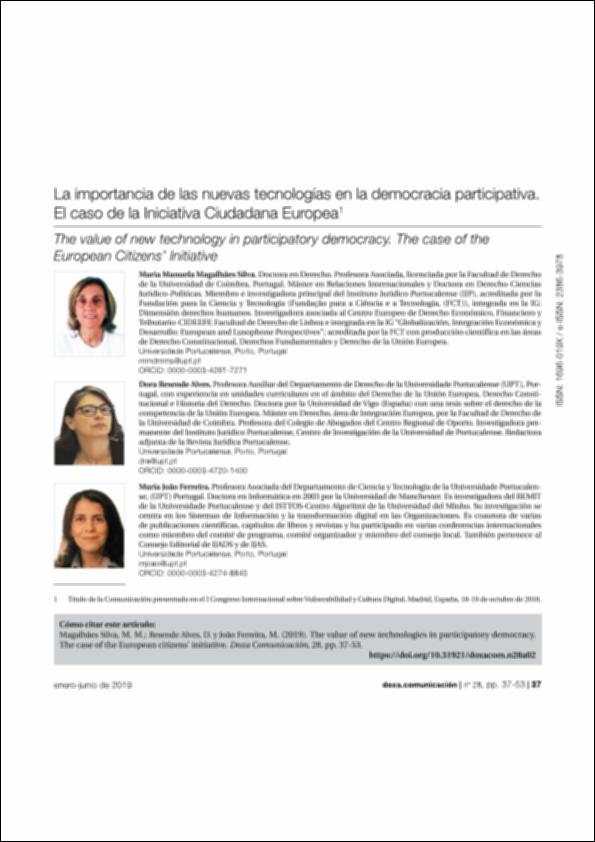Please use this identifier to cite or link to this item:
http://hdl.handle.net/10637/10437Importancia de las nuevas tecnologías en la democracia participativa: el caso de la Iniciativa Ciudadana Europea

See/Open:
Importancia_MMagalhaes_DResende&MJFerreira_Doxa_2019_es.pdf
español
723,16 kB
Adobe PDF
See/Open:
Value_MMagalhaes_DResende&MFerreira_Doxa_2019_eng.pdf
english
639,42 kB
Adobe PDF
See/Open:
Importancia_MMagalhaes_DResende&MJFerreira_Doxa_2019_es.epub
español
1,43 MB
EPUB
See/Open:
Value_MMagalhaes_DResende&MFerreira_Doxa_2019_en.epub
english
1,54 MB
EPUB
| Title: | Importancia de las nuevas tecnologías en la democracia participativa: el caso de la Iniciativa Ciudadana Europea The value of new technologies in participatory democracy : the case of the European citizens’ initiative |
| Authors : | Magalhães Silva, Maria Manuela Resende Alves, Dora |
| Keywords: | Iniciativa Ciudadana Europea; Legislación; Unión Europea; Participación digital; Tecnología de la Información |
| Publisher: | CEU Ediciones |
| Citation: | Magalhães Silva, M. M.; Resende Alves, D. and João Ferreira, M. (2019). The value of new technologies in participatory democracy: the case of the European citizens’ initiative. Doxa Comunicación, 28, pp. 37-53. |
| Abstract: | La participación democrática sigue siendo el camino a seguir por las sociedades que buscan una paz estable mediante el ejercicio de una ciudadanía activa. Desde 2012, el instrumento Iniciativa Ciudadana
Europea está presente en el proceso de elaboración de las disposiciones jurídicas y normativas de la Unión Europea. Uno de los aspectos de esta ciudadanía es el de permitir a los ciudadanos que se
involucren en la toma de decisiones a través de la participación en el ejercicio del trabajo legislativo. El Tratado de Lisboa introdujo el derecho a la Iniciativa Ciudadana Europea (en ingles, ECI). El objetivo
era implicar activamente a los ciudadanos en la toma de decisiones en Europa, ofreciéndoles una forma indirecta de iniciativa legislativa. Las tecnologías de la información (TI) son, en general, la base de
las organizaciones modernas, y los cambios en este campo se producen a un ritmo vertiginoso, deteniendo el desarrollo de los modelos tradicionales y obligando a las organizaciones a implementar
nuevos modelos, nuevas formas de trabajar y comunicarse. En este contexto, la Comisión Europea, sin ignorar la relevancia y las transformaciones inherentes al uso de las Tecnologías de la Información,
ha incluido el uso de estas tecnologías en varios ámbitos, concretamente en la Iniciativa Ciudadana Europea. En esta investigación se analiza en qué medida una plataforma, disponible en el contexto
de la Iniciativa Ciudadana Europea, se utiliza en las peticiones y la evolución de su uso hasta la finalización de la revisión en 2018. Democratic participation still is the way forward for societies that seek permanent peace through the exercise of active citizenship. Since 2012, the European Citizens’ Initiative instrument has emerged in the process of drafting legislative acts of the European Union. One of the facets of this citizenship is to enable citizens to become involved in decision-making through participation in the exercise of legislative initiative. The Lisbon Treaty introduced the right to the ECI. The aim is to actively involve citizens in the European decision-making, giving them an indirect form of legislative initiative. Information technologies (IT) are the essence of up-to-date organizations in general, and changes in this field are occurring at an uncontrollable pace, interrupting traditional models and forcing organizations to implement new models, new ways of working and communicating. In this context, the European Commission, not ignoring the relevance and transformations inherent in the use of IT, has included its use in several areas, namely in the European Citizens’ Initiative. In this research is analysed how much a platform available in the European Citizens’ Initiative context is used in petitions and the evolution of this same use until the completion of the review in 2018. |
| Director(s): | Ferreira, María Joäo |
| URI: | http://hdl.handle.net/10637/10437 |
| ISSN: | 1696-019X 2386-3978 |
| Issue Date: | 21-Jun-2019 |
| Appears in Collections: | Doxa.Comunicación nº 028 (2019) |
Items in DSpace are protected by copyright, with all rights reserved, unless otherwise indicated.

